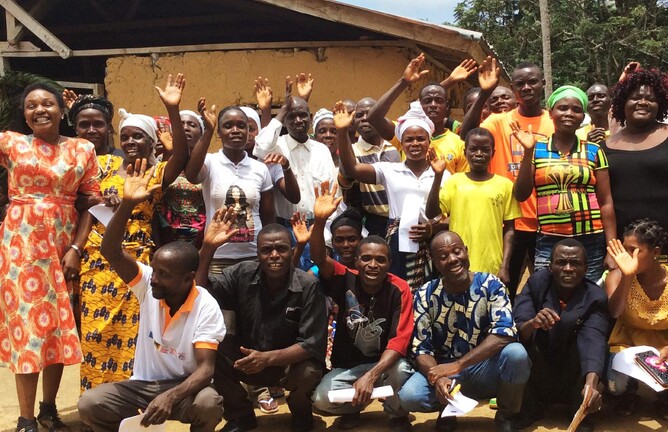Liberia has a unique history of trauma that has battered her people in waves. Before a generation could recover from a brutal civil war, the Ebola virus hit them—a crisis that shook the world in its relentless ferocity.
In December 2014, the International Rescue Committee (IRC) began a program to strengthen the mental health systems and improve quality service delivery, first in Montserrado County, in communities close to the capital of Monrovia. Then, in January 2016, the IRC set out for the southeast counties of River Gee and Maryland to implement mental health activities. Sarah Nalule Lwanga, a Clinical Psychologist who is also the Mental Health and Psychosocial Manager for the IRC, was surprised to discover that there was very minimal mental health care: only four facilities in both Maryland and River Gee Counties, inconsistent supply of psychotropic drugs, no records or system for mental health services. It would be like starting from scratch.
MAF supported the IRC by providing the only flights available between the capital of Monrovia and the southeast where they work, saving days of time for staff that would otherwise be spent on the rough dirt roads of Liberia.
“We used to drive or take the UN flights, but when they closed, things changed,” Sarah explains. The UN ended their flights to Maryland County close to the time that MAF began flying in Liberia. The timing was a lifesaver for those working in the southeast – the farthest point on the worst roads.
“People started saying, ‘the only hope is MAF’.” Sarah is grateful she doesn’t have to go by car. “If you miss MAF, you take the road.”
During the Ebola outbreak, the truth was that infection and death could come from even a loving touch or an act as simple as breathing. Don’t touch. Don’t visit your mother; she is dying. Don’t breath the same air as her; leave her to die. Yes, she is in agony. Don’t clean up the blood. No, you can’t even say goodbye.
Such levels of repetitive trauma produce mental scars. Yet no one signed up for therapy or joined mental health support groups, and few received prescription drugs to ease the pain.
Building a strong mental health care system from almost nothing in Liberia has involved some unique challenges for Sarah and the IRC team. “The biggest issue is that mental health is misunderstood and associated with witchcraft,” Sarah describes. Witchdoctors rule with spells and charms, and this age-old practice is still part of Liberia’s DNA, particularly in the rural areas. Liberians would turn to these familiar, albeit dangerous and complicated sources as a first recourse.
Sometimes problems are compounded by unscrupulous, or simply untrained pastors mixing Christianity with traditional African beliefs and using churches as an alternative to physical and mental health services. A common practice among rural churches is “Prayer Yards” – a space outside a church where someone can go for help. Often for a fee, the person is told what to do and will blindly obey.
"Somebody might lose a loved one, and because they can’t overcome the pain, they go to the prayer yard for comfort. There they might be told to fast for 30 days, and before we know it they’re taken to hospital in a critical condition, when the problem is just a mental health challenge,” Sarah explains. “There’s also a lot of stigma and discrimination with mental health and high levels of substance abuse.”
With decades of no proper treatment or counseling for those suffering from mental health issues, many turn to drugs and alcohol which inevitably leads to crime or the breakdown of parent-child relationships.
With such enormous challenges, it’s no small feat that in two and a half years the IRC now has a system in place for all 37 health facilities across Maryland and River Gee Counties that includes setting up a reporting system, offering psychotropic medication to patients, providing group and individual counseling, and support for patients with substance abuse, mental disorders, psychosis, acute stress, depression, grief and bereavement.
In addition to mental health services for patients, the program also expanded to the community, working with prison inmates and correction officers to handle emotional crisis with supportive communication, provide workshops for teachers on technical skills in communicating with children and adolescents, and establishing community mental health support groups.
Sarah couldn’t be happier with the results. "Now, people seeking mental health services from the health facilities have gone high."
Photo: Members of Community Mental Health support group, Waholo Town, Maryland
